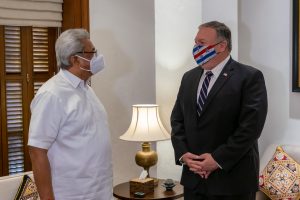It has been now a year since Gotabaya Rajapaksa claimed the presidency of Sri Lanka. Rajapaksa’s ascent to the high office had been a process in the making: The populace was weary of the political alliance between the Sirisena-Wickremesinghe government, which ruled the country from 2015 to 2019. The unlikely alliance, which won a stunning (and, for Rajapaksa supporters, upsetting) victory in the 2015 elections, promised to help with economic recovery, course-correct Sri Lanka foreign policy, and end corruption.
However, given – ironically – a long list of corruption allegations, constant political scandals – President Maithripala Sirisena ousted the prime minister in an unconstitutional move – and the subsequent Easter bombings attacks in 2019, the political marriage was doomed to be short-lived. And the Sri Lankan public yearned for a Leviathan who could give them stability, prosperity, and, especially, security. Who else could fill that role of the Leviathan other than the mastermind and strongman who won the war against the Tamil Tigers, Gotabaya Rajapaksa?
Carried by a general will and support of the electorate, Rajapaksa rushed from one victory to the other. Not only did he win triumphantly in the presidential polls on November 18 last year, he also secured victory for his party, the Sri Lanka People’s Front, in parliamentary elections in August. The victory was powered by four factors: First, corruption under the Sirisena-Wickremesinghe alliance; second, the Easter bombings of 2019; third, the split within the opposition; and fourth and finally, the handling of the COVID-19 pandemic. These events secured a super-majority for the Rajapaksa brothers, clearing the way for uninterrupted, decisive, and forceful majoritarian politics. The Sinhala population wanted a government of the Sinhalese, for the Sinhalese, and by the Sinhalese. And it was Gotabaya Rajapaksa who could give them that government, as the consolidation of the Rajapaksa clan is effectively the consolidation of Sinhalese-Buddhist nationalism.
Domestically, the popular Sinhala will translated into the abolition of legal strings to trim the powers of the president, with the 19th Amendment, introduced by the previous government to puts curbs on executive power, on its way out. Internationally, the Sinhalese popular will translated into backtracking from the co-sponsored Resolution before the United Nations Human Rights Council in 2015. The resolution indicated willingness by the previous government to engage with the prime human rights body in order to deal with war crimes committed during the Sri Lankan civil war and enter the process of transitional justice. As the current foreign minister, Dinesh Gunawardena, said before the United Nations Human Rights Council in February:
The previous Government had violated all democratic principles of governance as it declared support for the Resolution even before the draft text was presented, sought no Cabinet approval to bind the country to deliver on the dictates of an international body, had no reference to the Parliament processes, undertakings, and repercussions of such co-sponsorship, and included provisions which were undeliverable due to its inherent illegality, being in violation of the Constitution the supreme law of the country.
Engaging with international bodies is a tactic, as I have written elsewhere, by post-colonial governments to, first, attract international investments in a neoliberal environment, which serves the prosperity of the elite in Sri Lanka. Second and coinciding with this, it is a matter of renewing governmental legitimacy. Sri Lankan governments, however, have always been suspicious of international bodies as they consider them Western Trojan horses.
Meanwhile, behind the international smokescreen, the Rajapaksas have continued to militarize public life, render the country as a debtor and tributary to China, entrench marginalization of minorities, intimidate activists, and abandon the transitional process in the aftermath of a vicious war that left more scars. The COVID-19 pandemic was eventually used as a pretext to expand a surveillance system to monitor and control the population, fulfilling the prime role of the Leviathan: offering protection in exchange for control. But protection is for the majority, while the minorities are unprotected unless they navigate within the prescriptive nationalist parameters of majoritarianism.
Sri Lanka is the perfect example when it comes to stereotypes of mismanagement in the post-colonial developing world: rampant corruption, lavish elitism, and nationalist policies that cater toward the majority to manage the remnants of colonial antiques in the post-colonial era. In a strange metamorphosis, the Sinhalese post-colonial elite used nationalism and religion to pander the electoral majority and stir up tensions among the communities in order to keep the upper hand over the Sinhalese population and keep the minorities at bay. The problem is that post-colonial elites used majoritarian and communitarian policies to pit one community against each other in order to seize power – not noticing that the Leviathan has developed into a militant nationalist fanatic that is spiraling out of control.
Dr. Thamil Venthan Ananthavinayagan is a lecturer for public international law at Griffith College Dublin since 2017. Prior to this lectureship at GCD, he worked as a Fellow at the Irish Centre for Human Rights in Galway, Ireland. His first book “Sri Lanka, Human Rights and the United Nations” was published by Springer earlier this year.

































